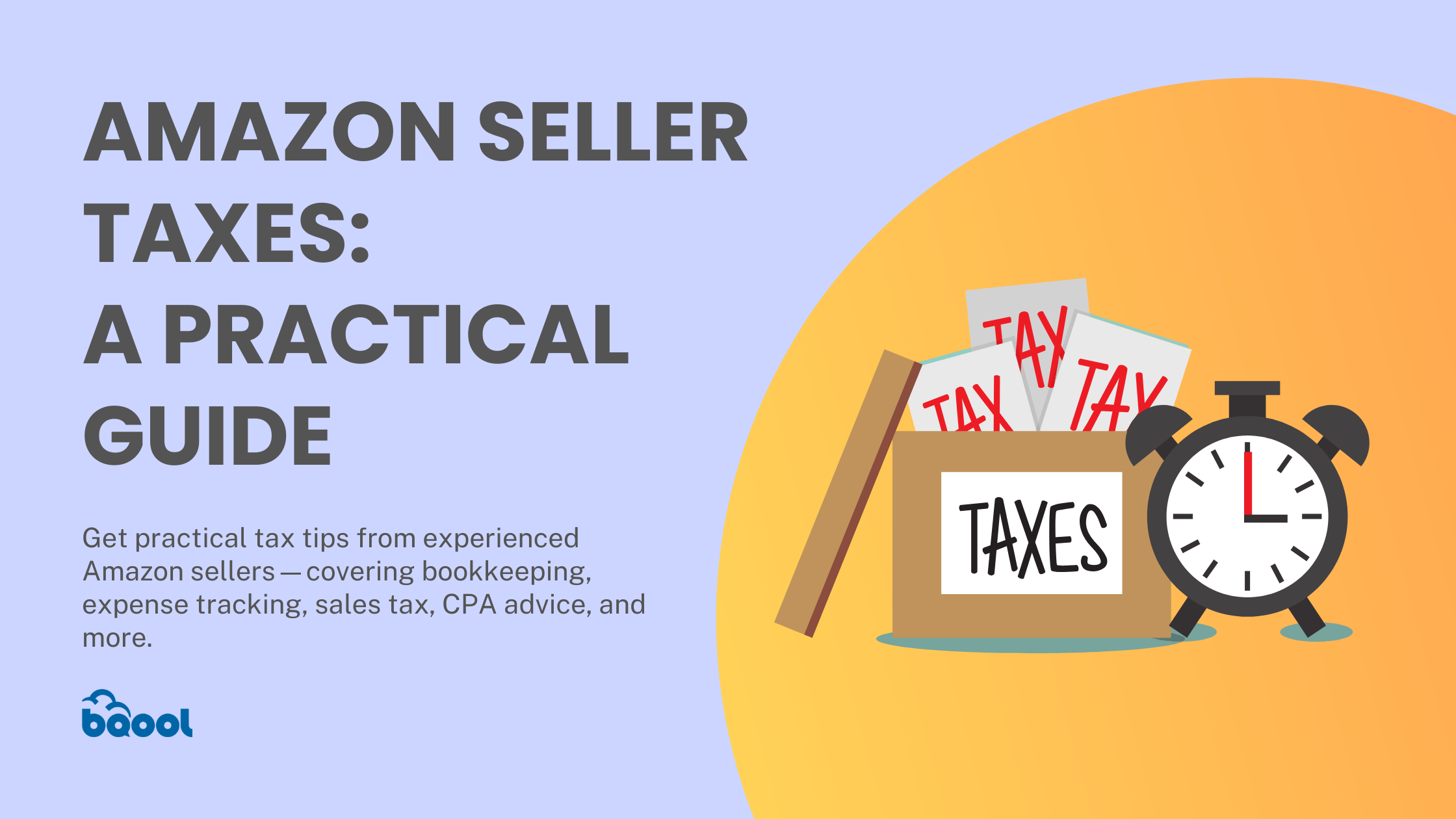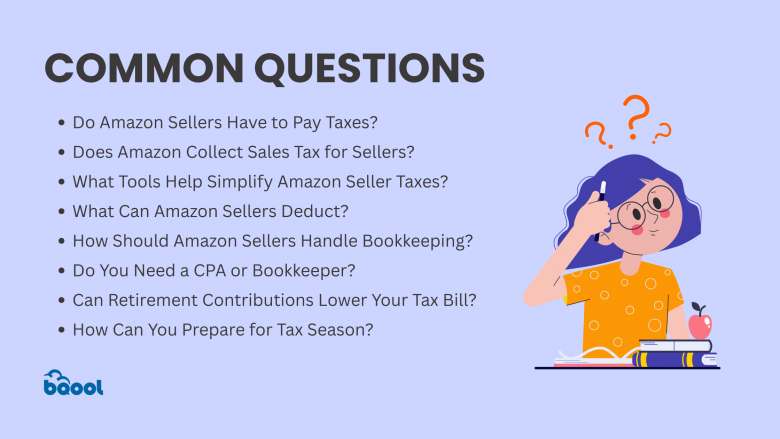Amazon Seller Taxes: A Practical Guide

Confused about Amazon seller taxes? You’re not alone.
Whether you’re making your first few sales or scaling toward six figures, tax season catches many sellers off guard. From income taxes to deductions and tracking tools, this guide walks you through exactly what to do—with no fluff.
What You’ll Learn
In this guide, you’ll find clear answers to common tax questions Amazon sellers face—especially if this is your first time filing. You’ll learn what taxes you’re responsible for, what expenses you can deduct, which tools simplify tracking, and when to bring in professional help.

Overview
- New to Amazon Selling? Start Here
- Do Amazon Sellers Have to Pay Taxes?
- Does Amazon Collect Sales Tax for Sellers?
- What Tools Help Simplify Amazon Seller Taxes?
- What Can Amazon Sellers Deduct?
- How Should Amazon Sellers Handle Bookkeeping?
- Do You Need a CPA or Bookkeeper?
- Can Retirement Contributions Lower Your Tax Bill?
- How Can You Prepare for Tax Season?
- FAQs
- Conclusion
New to Amazon Selling? Start Here
Separate your business and personal finances.
If you don’t, you might one day hunt for a receipt—only to realize it’s buried among your grocery expenses. Not ideal. Use a dedicated bank account and credit card for all business-related income and expenses to keep your finances clear.
Register your business.
You can start as a sole proprietor and later switch to an LLC. Although you don’t need an LLC to sell on Amazon, it provides legal protection by separating personal and business liability (JungleScout, 2024).
Register with your state based on your structure. Wholesale sellers need both a business license and sales tax permit; private label or retail arbitrage sellers typically do not.
Start tracking everything.
From day one, log all income, fees, purchases, and subscriptions—even if it’s just a side hustle. Use spreadsheets or Amazon’s Reports for quick access to your sales and expense data.
Track referral fees, shipping and fulfillment costs, advertising spend, and software subscriptions. Future You will thank you for diligent expense tracking.
Leverage technology—see the best Amazon accounting software—to calculate costs accurately and adjust your pricing effectively.
Pick a system for your books.
QuickBooks plans start at $30.76/month. Inventory Lab starts at $69/month.
Get a CPA early.
Partnering with an Amazon‑savvy CPA now prevents costly errors and ensures compliance. Learn more about hiring an Amazon Accountant.
Do Amazon Sellers Have to Pay Taxes?
Yes. Sellers must file income taxes—even if Amazon handles sales tax. You’re responsible for business income, self-employment tax, and deductible expenses.
Does Amazon Collect Sales Tax for Sellers?
Yes—in most states. Five states have no statewide sales tax:
- Alaska
- Delaware
- Montana
- New Hampshire
- Oregon
Note: Local jurisdictions may still impose sales tax if you store inventory there.
| Tax Type | Who Handles It | Your Role |
|---|---|---|
| Sales Tax | Amazon | Confirm states, keep records |
| Income Tax | You | File federal/state returns annually |
Real Seller Tip: I use a prep center to avoid paying sales tax and never file tax exemption paperwork.
What Tools Help Simplify Amazon Seller Taxes?
- QuickBooks: Tracks income and expenses, syncs with your bank, and creates reports.
- Inventory Lab: Generates a clean profit & loss statement.
- GoToLister: Exports your Amazon sales, fees, and inventory costs for your CPA.
Real Seller Tip: GoToLister’s net profit reporting is rolling out soon to simplify your full tax view.
What Can Amazon Sellers Deduct?
- Inventory & Product Costs: Wholesale price, manufacturing costs, or any direct product costs (COGS).
- Shipping & Fulfillment Fees: Postage, prep materials, shipping supplies, and fulfillment center fees.
- Home Office Expenses: Rent, utilities, internet, furniture, and business-use electronics for a dedicated workspace.
- Seller Fees: Referral, FBA, storage, and platform fees.
- Vehicle Use & Mileage: Trips for sourcing, supply runs, or business meetings.
- Charitable Donations: Unsellable or damaged inventory donated to charity.
- Subscriptions & Memberships: E-commerce tools, business platforms, and seller support services.
- Business Education: Courses, e-books, webinars, and training related to Amazon selling.
- Business Software: Tax, inventory, analytics, and repricing tools.
- Marketing & Advertising: Online ads, social media promotions, branded packaging, and promotional materials.
- Employee Compensation: Wages, salaries, and benefits.
- Professional Services: Payments to accountants, consultants, legal advisors, designers, or copywriters.
Also, remember that import tariffs paid on overseas inventory can effectively raise your cost of goods and should be factored into your expenses.
Real Seller Tip: Your phone can be an expense. Your car can be an expense. Just make sure your CPA understands how to apply that.
How Should Amazon Sellers Handle Bookkeeping?
Track consistently
Update your records weekly or bi-weekly—waiting until tax season only creates panic and confusion.
Reconcile regularly
Match your income and expenses in your books to your bank and Amazon payout reports to ensure no transactions are missed.
Store documentation
Save digital or physical copies of receipts and reports. Keep cost and sale records for each product for accurate deductions.
Beginner tip
If you’re under $10K in monthly sales, a spreadsheet is okay. Once you scale, automated tools save hours and reduce errors.
Real Seller Tip: If your books are clean, taxes are a breeze.
Too much time spent managing pricing manually? Let our smart repricer handle it for you—so you can focus on growing your business, not spreadsheets.
Do You Need a CPA or Bookkeeper?
If you’re feeling overwhelmed or unsure if you’re doing it right, it’s time to consider one:
- Bookkeepers track and categorize finances.
- CPAs file taxes, find deductions, and avoid mistakes.
Real Seller Tip: I paid $700 to offload tax stress and focus on sourcing—money well spent.
Can Retirement Contributions Lower Your Tax Bill?
Yes. Contributing to a SEP IRA, Solo 401(k), or traditional IRA can significantly reduce your taxable income. Providers like Fidelity, Vanguard, and Charles Schwab offer these accounts. A CPA can help calculate your ideal contribution based on income and tax bracket.
Real Seller Tip: I invested in retirement accounts, and it lowered how much I owed in taxes.
How Can You Prepare for Tax Season?
Start early
Begin organizing your records in Q1—don’t wait until January of the following year.
Keep reports updated
Maintain monthly profit and loss statements and keep your inventory log current.
Meet your CPA in Q4
This gives you time to adjust contributions, clean your books, or plan for deductions.
Real Seller Tip: I file an extension—but only because my books are clean and ready.
FAQs
Do Amazon sellers need to pay quarterly taxes?
Yes. If you expect to owe more than $1,000 in federal income taxes, you must make estimated quarterly payments.
What is a 1099-K and when do I get one from Amazon?
The 1099-K reports income processed by Amazon. Since 2022, Amazon issues it for gross payments over $600, regardless of transaction count.
How do I file taxes as an Amazon seller?
Most Amazon sellers file a Schedule C with their Form 1040, reporting income and deductions.
Can I deduct health premiums and retirement contributions?
Yes. Self-employed health premiums and retirement contributions may be deductible.
Does Amazon handle sales tax for me?
Amazon collects and remits sales tax in most states, but you’re responsible for income taxes and confirming nexus settings.
What is a sales tax nexus and why does it matter?
Nexus is your business presence in a state—often established when Amazon stores your inventory there.
What if I didn’t track my expenses this year?
Rebuild records with Amazon reports, bank statements, and credit card logs. Accurate reconstruction beats missing deductions.
Can I deduct my home office if I sell part-time?
Yes, if the space is used regularly and exclusively for your Amazon business.
What’s the best bookkeeping software for Amazon sellers?
QuickBooks is a solid general tool; Inventory Lab integrates directly with FBA and tracks COGS.
Get real seller tips on Amazon Taxes
Watch our most recent video for live tips!
Start selling more on Amazon with BQool’s AI Repricer
Start your free trial








